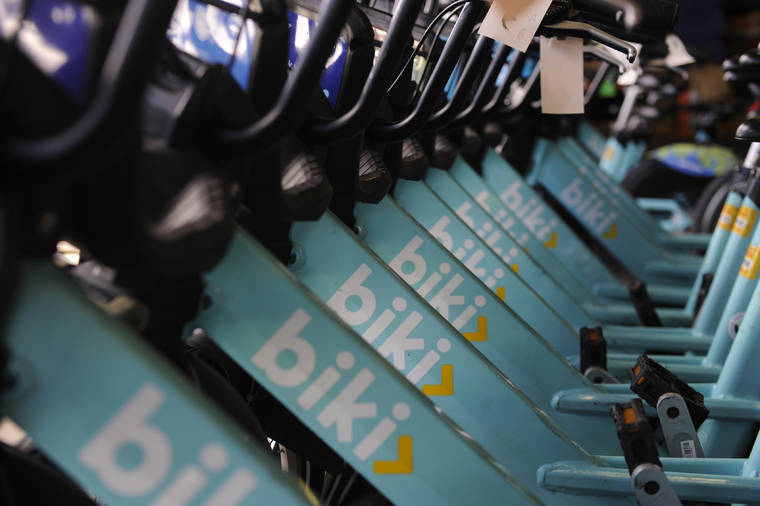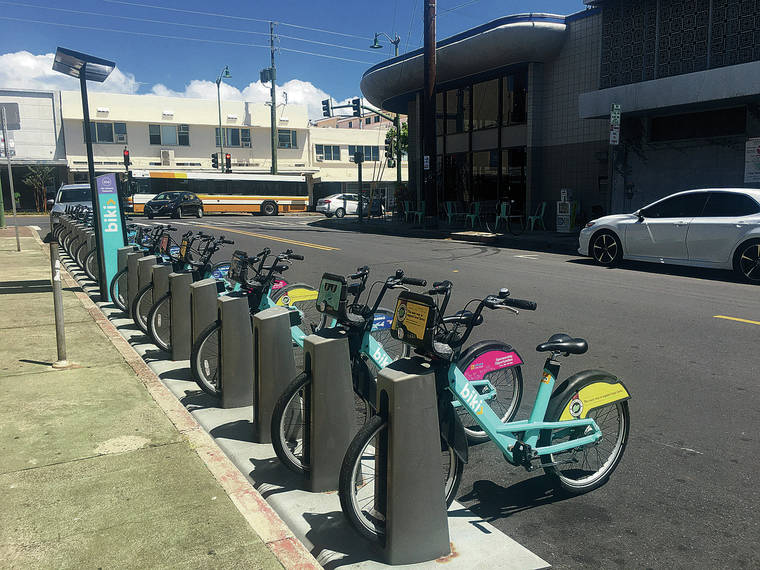Honolulu’s 3-1/2-year-old bikeshare program known as Biki has not benefited the city and lacks accountability and transparency, according to an audit Opens in a new tabreleased Friday afternoon.
Although the city support for the program might initially have been justified on its merits to provide an environmentally friendly transportation option, the auditor says it “lacked a cost-benefit analysis to truly measure the program’s worth.”
The audit, which was conducted as a result of
a City Council resolution approved last year, said Bikeshare Hawaii, the nonprofit that launched the program, receives “a myriad of city exemptions to support its operations that are not formalized and lack transparency.”
“Furthermore, these exemptions also have a cost element and the cost to the city, in terms of metered parking stall revenues, and permit and concession fees, are not calculated or even considered when evaluating the program,” said auditors in a summary. “Bikeshare Hawaii is reaping significant benefits, with little return to the city and its taxpayers, beyond bike operations itself. Going forward, the city should re-evaluate its relationship, right-size the benefits and exemptions, and properly monitor its grant agreement with Bikeshare Hawaii.”
Altogether, the audit said that under its agreement with Bikeshare Hawaii, the city lost out on an estimated $460,728 in revenue in 2019 due to the displacement of metered stalls and permit fee exemptions.
In addition, the city does not get a share of Bikeshare’s fare or sponsorship revenue despite similar arrangements between municipalities and bikeshare programs in other jurisdictions.
The audit also said the city Department of Transportation Services was not effectively monitoring Bikeshare for its operational and fiscal performance.
Bikeshare Hawaii Opens in a new tab launched Biki in June 2017 with $2 million in startup funds from the city and state. Although Bikeshare Hawaii, a nonprofit, manages the system, Secure Bike Share Hawaii, a for-profit entity, made the initial investment in the Biki bikes and runs day-to-day operations.
Despite a few hiccups at the start, the bikeshare was successful at its two-year mark and became the sixth most used bikeshare system in the nation.
Currently, Bikeshare Hawaii offers about 1,300 bikes at more than 130 self-service Biki Stops that cover a 6.25-mile service area stretching from Iwilei to Waikiki and Kaimuki.
Bikeshare Hawaii Executive Director Todd Boulanger said in a statement the organization is reviewing the audit.
“Since our launch in June 2017, as a public private partnership with the City, we’ve succeeded in our mission to provide affordable, fun, and healthy mobility,” Boulanger said in a statement. “As a local non-profit organization our relationship with the city is a
partnership and not a
transactional one.”
“Rental payment of public street space is still an emerging issue nationwide and not all mobility providers pay a fee to use street space,” he continued. “We look forward to continuing our evolving partnership with the City in 2021 and working on items that will enhance our collaboration and continue to provide the public with an affordable and dependable transportation option.”
The city auditor’s report highlighted the following, among other issues:
>> The annual estimated revenue loss from the replacement of 44 metered stalls with Biki Stops totaled $303,692 in 2019.
>> The city exempted Bikeshare Hawaii from paying street usage permit fees and has foregone an estimated $157,000 annually.
>> The city did not share in the $5.6 million in Bikeshare revenue collected between fiscal years 2017 and 2019.
>> The city did not share in the nearly $1.4 million in sponsorship revenue between fiscal years 2017 and 2020. In addition, Biki does not report sponsorship amounts to DTS as required by contract.
>> The DTS, which is tasked with oversight of bikeshare services, is not effectively monitoring Bikeshare for its operational and fiscal performance. DTS should be collecting and maintaining records from Bikeshare Hawaii, including quarterly financial reports and progress payment reports, but does not have them on file. DTS could not provide documentation for seven of 11 contract control requirements.
The audit made nine recommendations to improve fiscal responsibility, as well as Bikeshare’s transparency and accountability, which include collecting street usage permit and concession fees in the future, formally calculating lost revenue and revisiting terms of its grant agreement to receive a share of revenue similar to other city programs.
The city should also be recognized as a sponsor, and consider placing messaging on Biki bikes that could promote the Honolulu Zoo or encourage citizens to vote.
In a letter Wednesday to acting city Auditor Troy
Shimasaki, DTS said it was “considering several options to increase its role in directing bikeshare operations,
increasing program oversight, and improving
transparency.”
The department said some of the estimated amounts in lost revenue from converted parking stalls were overstated, but agreed it should better track and report overall performance of the bikeshare program to improve service delivery.
“The greatest lesson learned since the launch of Biki is how the people of
Honolulu value and rely on this bikeshare service,” wrote acting DTS Director Jon Nouchi. “Even during this pandemic, there are a core group of riders who continue to travel by Biki
as a primary and preferred mobility option. Department of Transportation Services is committed to adopting the necessary changes and reforms to ensure this essential service remains available as part of the City’s multimodal transportation network.”




